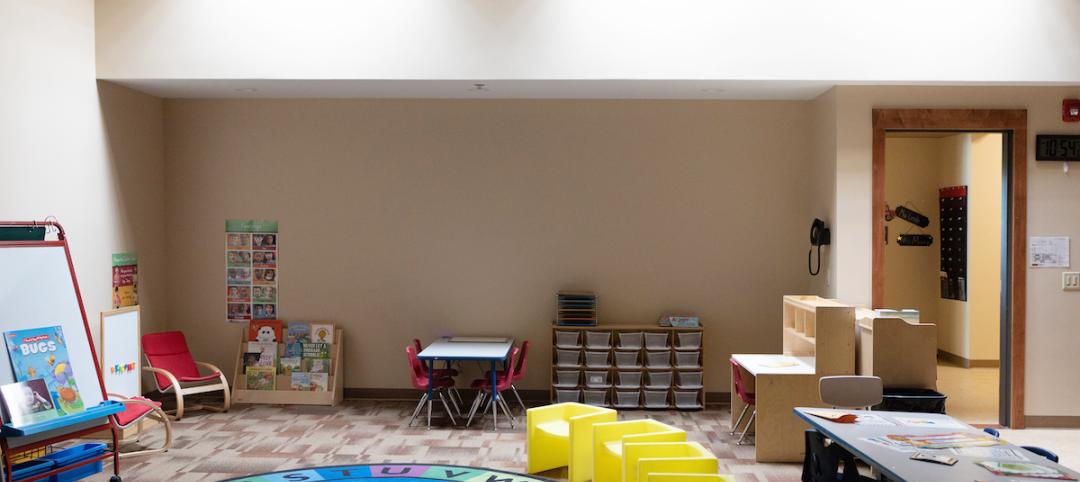Perkins Eastman recently announced the publication of white paper “Measuring Up: Using Pre- and Post-Occupancy Evaluation to Assess High-Performance School Design.”
“Measuring Up” documents a design research study conducted by Perkins Eastman that used the Dr. Martin Luther King, Jr. School, located in Cambridge, MA, as a test case. The study showed that the high-performance design strategies employed in the design of the MLK School had a significant and measurable impact on both occupant satisfaction and building performance. These findings tie high-performance design strategies to improved building performance and increased satisfaction, bringing the theoretical value-add proposition for high-performance design into reality.
The overarching goal of the school’s design was to synthesize objectives to enhance educational outcomes within this urban district and to pursue attributes of Net Zero Energy. Together, these goals inspired a sustainable, high-performance urban learning environment that can serve as a prototype for the school district and potentially nationwide. These same lessons also add to the design industry’s understanding of high-performance design.
The white paper is co-authored by a group at Perkins Eastman representing broad research, sustainability, and K-12 school design. Sean O’Donnell, leader of Perkins Eastman’s K-12 practice, says, “By evaluating and analyzing our work, we are able to make smarter decisions moving forward to enhance educational outcomes, improve our communities, and reduce our environmental impact—and to do so in the most economical means possible.” He continues, “This feedback loop moves us closer to creating truly sustainable, high-performance learning environments for our clients and communities.”
Perkins Eastman’s study is distinguished from other academic studies investigating Indoor Environmental Quality (IEQ) in schools in that it was designed to examine multiple, concurrent factors—producing a more holistic picture than single variables studied in isolation can provide. In Perkins Eastman’s study, satisfaction levels increased between 53-66% in every measure, indicating meaningful improvement. These measures included: daylight, thermal comfort, acoustics, and air quality.
By showing that even minor improvements in building performance using high-performance design strategies can significantly impact occupant satisfaction and performance, this case study becomes applicable to any industry where occupant performance is significant— especially in educational, office, and healthcare environments.
“Measuring Up” is available for download here.
Related Stories
K-12 Schools | Jan 25, 2023
As gun incidents grow, schools have beefed up security significantly in recent years
Recently released federal data shows that U.S. schools have significantly raised security measures in recent years. About two-thirds of public schools now control access to school grounds—not just the building—up from about half in the 2017-18 school year.
ProConnect Events | Jan 16, 2023
6 more BD+C ProConnect Events in 2023 – The videos show why you should participate
ProConnects bring building product manufacturers and suppliers together with architects, contractors, builders, and developers to discuss upcoming projects and learn about new products and technical solutions.
K-12 Schools | Dec 23, 2022
Vacant Target store in Minnesota turned into early childhood education center
Lincoln School, a former 90,000-sf Target retail store in Fergus Falls, Minn., was repurposed into Independent School District 544’s newest campus.
Multifamily Housing | Dec 21, 2022
Bay Area school district builds 122 affordable apartments for faculty and staff
The 122 affordable apartments at 705 Serramonte, Daly City, Calif., were set aside not for faculty and staff at Jefferson Union High School District.
K-12 Schools | Dec 20, 2022
Designing an inspiring, net zero early childhood learning center
LPA's design for a new learning center in San Bernardino provides a model for a facility that prepares children for learning and supports the community.
Sponsored | Resiliency | Dec 14, 2022
Flood protection: What building owners need to know to protect their properties
This course from Walter P Moore examines numerous flood protection approaches and building owner needs before delving into the flood protection process. Determining the flood resilience of a property can provide a good understanding of risk associated costs.
HVAC | Dec 13, 2022
Energy Management Institute launches online tool to connect building owners with HVAC contractors
The National Energy Management Institute Inc. (NEMI) along with the Biden administration’s Better Air in Buildings website have rolled out a resource to help building owners and managers, school districts, and other officials find HVAC contractors.
Education Facilities | Nov 30, 2022
10 ways to achieve therapeutic learning environments
Today’s school should be much more than a place to learn—it should be a nurturing setting that celebrates achievements and responds to the challenges of many different users.
K-12 Schools | Nov 30, 2022
School districts are prioritizing federal funds for air filtration, HVAC upgrades
U.S. school districts are widely planning to use funds from last year’s American Rescue Plan (ARP) to upgrade or improve air filtration and heating/cooling systems, according to a report from the Center for Green Schools at the U.S. Green Building Council. The report, “School Facilities Funding in the Pandemic,” says air filtration and HVAC upgrades are the top facility improvement choice for the 5,004 school districts included in the analysis.
Energy-Efficient Design | Nov 14, 2022
How to achieve net zero energy in five steps
Martine Dion and Ethan Seaman share net zero energy best practices with owners and developers.
















